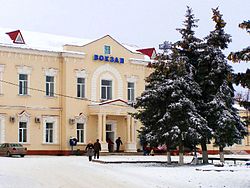world.wikisort.org - Ukraine
Podilsk (Ukrainian: Поді́льськ, pronounced [poˈd⁽ʲ⁾ilʲsʲk]; Romanian: Bârzula or Bârzu), until May 2016 Kotovsk (Ukrainian: Котовськ), is a city in Odesa Oblast, southern Ukraine. Administratively, Podilsk is incorporated as a town of oblast significance. It also serves as the administrative center of Podilsk Raion, one of twenty-six districts of Odesa Oblast, though it is not a part of the district.
This article may be expanded with text translated from the corresponding article in Ukrainian. (July 2022) Click [show] for important translation instructions.
|
Podilsk
Подільськ | |
|---|---|
City | |
 Podilsk railway station | |
 Flag  Coat of arms | |
 Podilsk  Podilsk | |
| Coordinates: 47°44′31″N 29°32′06″E | |
| Country | |
| Oblast | |
| Raion | Podilsk Raion |
| Area | |
| • Total | 25.44 km2 (9.82 sq mi) |
| Elevation | 248 m (814 ft) |
| Population (2021) | |
| • Total | 39,662 |
| • Density | 1,600/km2 (4,000/sq mi) |
| Time zone | UTC+2 |
| Postal code | 66300—314 |
| Area code | +380-4862 |
| Climate | Dfb |
| Website | podilska-gromada |
It had a population of 39,662 (2021 est.)[1]. In 2001, it had a population of 40,718. It is the largest city in the northern part of Odesa Oblast.
History
Birzula was first mentioned in Turkish documents in 1772 as one of the settlements of the Dubossar raya. The Russian-Italian physicist Gleb Wataghin was born in Birzula in 1899.[2][circular reference]
The city is known as the place where Soviet military leader Grigori Kotovsky was buried in a mausoleum. In 1935, the city was renamed Kotovsk after him; formerly the settlement bore the name Birzula. The mausoleum was later destroyed during the Romanian occupation of Transnistria. The monument was (again) dismantled in June 2017 to comply with decommunization laws.[3]
A Vladimir Lenin statue in Kotovsk was pushed off its pedestal and broken into several pieces on December 9, 2013.[4][5][6] On 21 May, 2016, Verkhovna Rada adopted decision to rename Kotovsk to Podilsk and Kotovsk Raion to Podilsk Raion according to the laws prohibiting names of Communist origin.[7]
Transportation
The city has a major railway station and depot on the Odesa—Zhmerynka line (a stretch of the Razdelnaya—Poberezhye line).
Gallery
- Suputnyk Hotel in Podilsk
- Podilsk supermarket
- City park
See also
- List of cities in Ukraine
References
- Чисельність наявного населення України на 1 січня 2021 / Number of Present Population of Ukraine, as of January 1, 2021 (PDF) (in Ukrainian and English). Kyiv: State Statistics Service of Ukraine.
- uk:Ватагін Гліб Васильович
- "In the Odessa region, a monument to the participant of the "red terror" Kotovsky was dismantled" (in Russian). UNIAN. 11 June 2017.
- "Лавина пішла: у Одеській області вночі зруйнували Леніна".
- "Ukraine protests: Riot police storm offices of opposition party in". Independent.co.uk. 10 December 2013.
- "Police: One more Lenin statue broken in Odesa region". Kyiv Post. 2014-01-04. Retrieved 2015-04-22.
- "Про перейменування деяких населених пунктів" (in Ukrainian). Holos Ukrainy. 21 May 2016. Retrieved 1 June 2016.
На других языках
- [en] Podilsk
[ru] Подольск (Украина)
Подо́льск (укр. Подільськ; до 1935 года — Би́рзула, до 2016 года — Кото́вск) — город в Одесской области Украины. Административный центр Подольского района.Другой контент может иметь иную лицензию. Перед использованием материалов сайта WikiSort.org внимательно изучите правила лицензирования конкретных элементов наполнения сайта.
WikiSort.org - проект по пересортировке и дополнению контента Википедии


